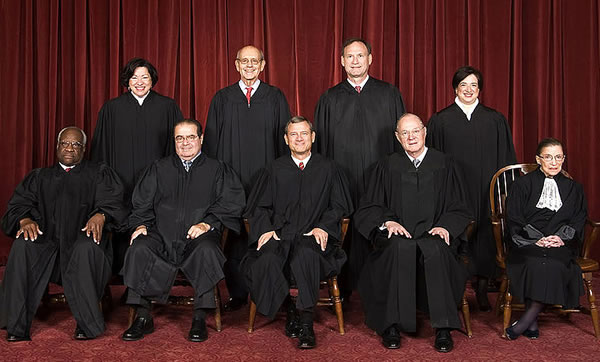

Share
By a 9-0 vote, the U.S. Supreme Court has ruled that Democratic President Barack Obama illegally made three “recess appointments” in 2011 to the National Labor Relations Board – virtually throwing out the hundreds of NLRB cases those appointees voted on.
Obama appointed the three members during a 3-day pro forma Senate recess, but Justice Stephen Breyer, writing for all of his colleagues, said that time was too short to make the moves. He did not mention the Senate GOP filibusters that forced Obama’s hand.
Though the court’s ruling tosses out at least 120 past NLRB decisions, because the three members were “illegal,” AFL-CIO President Richard Trumka downplayed its impact. He said that since the board now has five legal members, it can go ahead with its business. The ruling “clears up the legal landscape,” Trumka, who has a law degree, said.
He also said Obama was right, even when the court said the president was wrong.
Obama “made the recess appointments because obstructionism by Republican senators was about to make the NLRB inoperable. The president did the right thing and acted on solid legal authority in making these appointments. Had he not acted, millions of workers would have been deprived of their rights under our labor laws,” Trumka stated.
But the board itself differed with Trumka. It said it will have to revisit the cases on which the recess appointees voted.
And the Communications Workers, whose president, Larry Cohen, led the successful lobbying which forced the Senate to later change its rules and confirm Obama’s NLRB nominees, said the court’s decision just shows the need for even more rules changes there – to stop the filibusters on legislation, for example.
“The Senate functions under archaic procedures that must change,” CWA said. The Senate “has the right to set its own rules” but it’s the only “democratic meeting” – from a city council on up – where you need a super-majority of 60 votes out of 100 senators to act.
“We have seen the consequences of this rule…The Senate’s constitutional duty is to review the president’s nominees through ‘advice and consent’ — not use parliamentary tricks to impede his policy agenda.
“For thousands of workers, this decision has real-life consequences. Some 120 decisions made by the National Labor Relations Board in the period contested by the Noel Canning lawsuit may be challenged and justice for thousands of workers will be delayed, and in practice, denied,” CWA concluded.
Breyer didn’t mention the delays. He concentrated on when the Senate is in session – and when it isn’t.
“For purposes of the Recess Appointments clause” of the Constitution, “the Senate is in session when it says that it is, provided that, under its own rules, it retains the capacity to transact Senate business,” Breyer wrote in the ruling. “This standard is consistent with the Constitution’s broad delegation of authority to the Senate to determine how and when to conduct its business, as recognized by this court’s precedents.
“Although the Senate’s own determination of when it is and is not in session should be given great weight, the court’s deference cannot be absolute. When the Senate is without capacity to act, under its own rules, it is not in session even if it so declares.
But “under the standard set forth here, the Senate was in session during the pro forma sessions at issue. It said it was in session, and Senate rules make clear the Senate retained the power to conduct business. The Senate could have conducted business simply bypassing a unanimous consent agreement. In fact, it did so…
“Because the Senate was in session during its pro forma sessions, the president made the recess appointments at issue during a 3-day recess. Three days is too short a time to bring a recess within the scope of the clause, so the President lacked the authority to make those appointments.
Obama appointed the three “recess” NLRB members after the Senate GOP filibustered his regular nominees, preventing the 5-member board from ruling on anything because it didn’t have a quorum. The political controversy never came up in the Supreme Court argument last year, nor in Breyer’s ruling.
But Noel Canning Co., a Washington state firm, used it to challenge the legality of NLRB-imposed penalties as a result of a Teamsters Local 760 organizing drive. Backed by a wide array of business groups, Noel Canning won. And other firms used the case to challenge the NLRB’s legal authority. The board, which now has five legal members, will have to revisit those decisions.
“The Supreme Court has today decided the Noel Canning case,” the NLRB’s statement said. “We are analyzing the impact the court’s decision has on cases in which the January 2012 recess appointees participated. Today, the board has a full contingent of five Senate-confirmed members who are prepared to fulfill our responsibility to enforce the National Labor Relations Act. The agency is committed to resolving any cases affected by today’s decision as expeditiously as possible.

